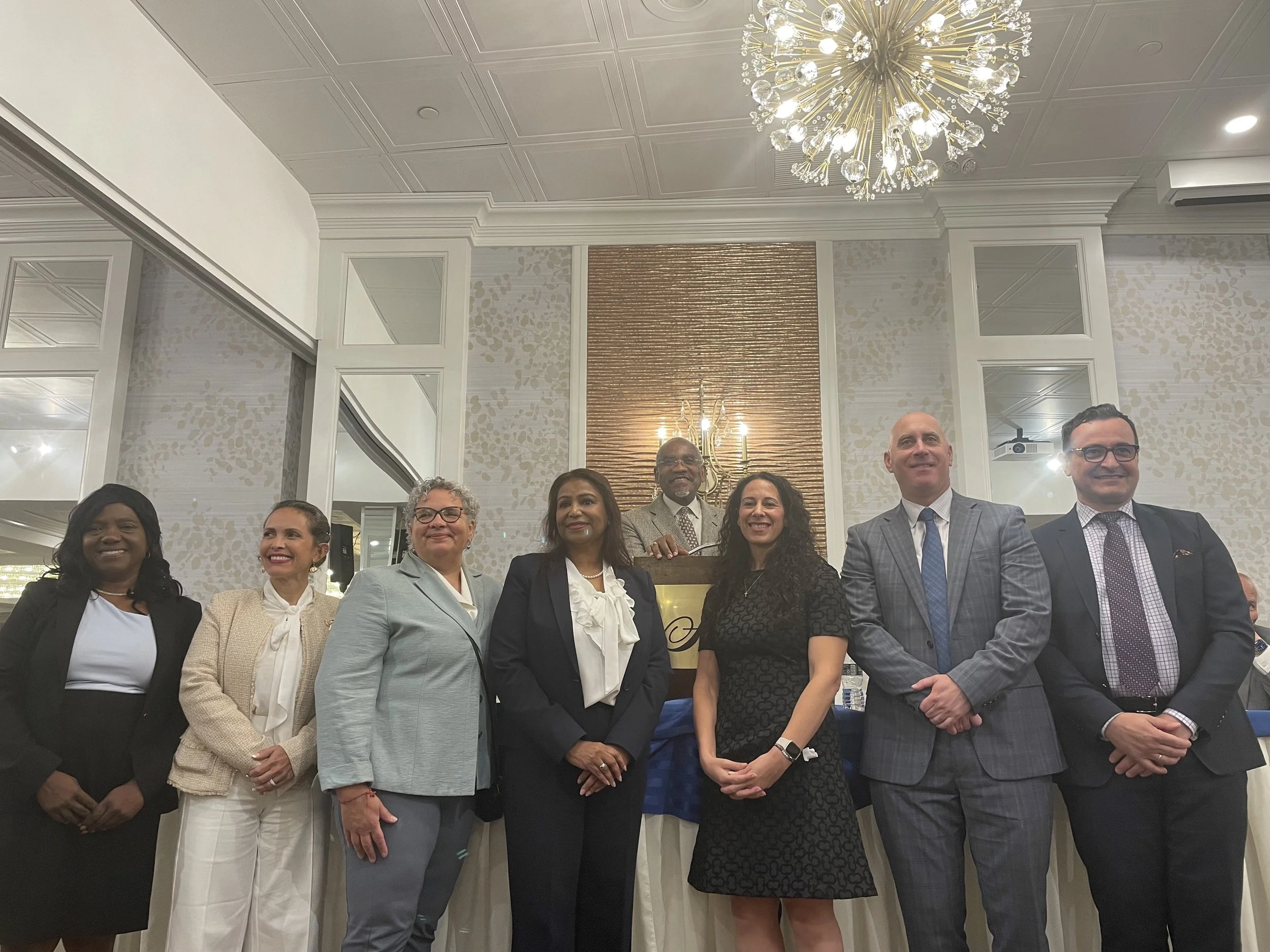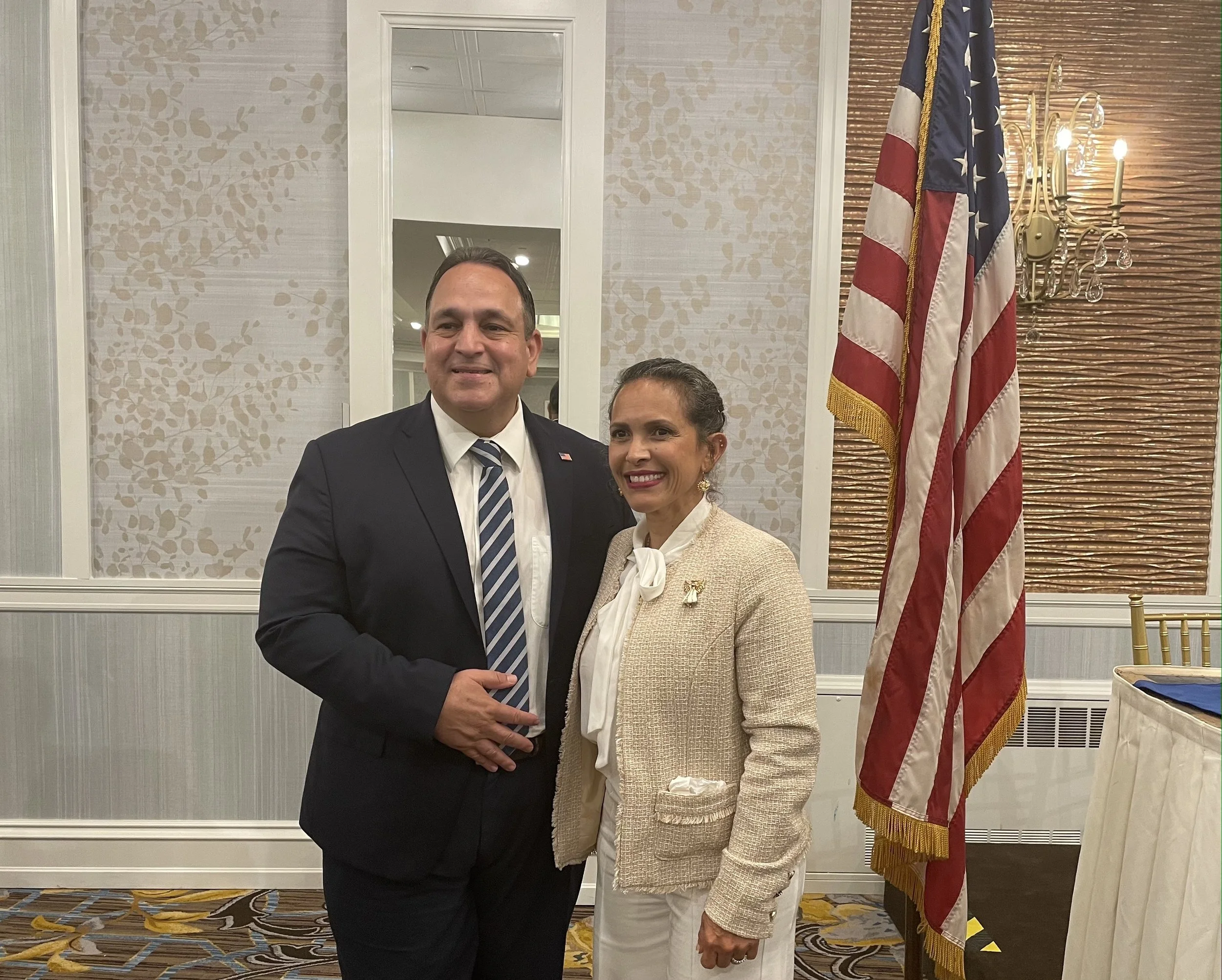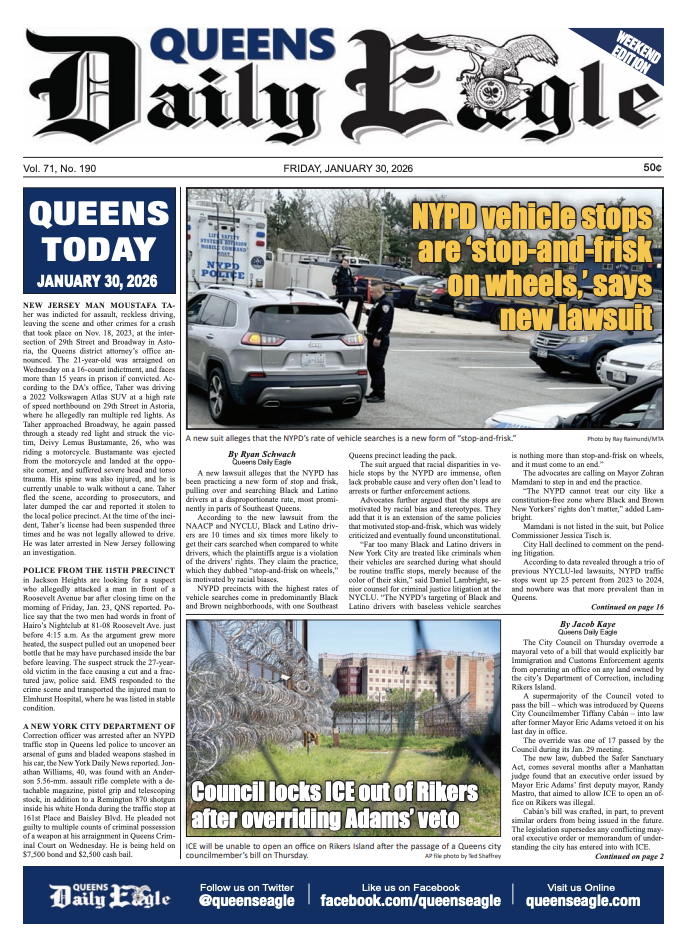Queens Dems nominate candidates for Supreme Court
/Judges Delsia Marshall, Lumarie Maldonado Cruz, Sandra Munoz, Andrea Ogle, Claudia Lanzetta, Alan Schiff and John Katsanos were nominated by Rep. Gregory Meeks (center, back) and the Queens County Democratic Party to run on the party line for Supreme Court justice in November. Eagle photo by Jacob Kaye
By Ryan Schwach
The Queens County Democratic Party nominated over half a dozen judicial candidates to run on its party line in the November race for Supreme Court during its annual judicial convention on Thursday night.
Seven judges – all of whom were elected to the city’s lower Civil Court within the past six years – were nominated near-unanimously by the party’s judicial delegates to run for the seven impending vacancies on the Supreme Court bench.
The party voted to back Civil Court Supervising Judge Alan Schiff, Civil Court Judges Delsia Marshall, Sandra Munoz, Andrea Ogle, John Katsanos and Acting Supreme Court Justices Lumarie Maldonado Cruz and Claudia Lanzetta in their bids for the Supreme Court.
Unlike Civil Court judges, Supreme Court judicial candidates do not run in a primary election. Instead, they are nominated by a political party’s judicial delegates to run on the party’s line in the November general election.
In Queens, where Democratic voters outnumber Republicans seven to one, judicial candidates nominated by the Democratic party are effectively guaranteed election to a 14-year-term.
The Queens County Democratic Party’s judicial conventions, like the one held Thursday at Antun’s in Southeast Queens, are typically pro-forma affairs. The judicial nominees are pre-selected by the party’s chairman, Rep. Gregory Meeks.
Nominees are almost always approved unanimously by delegates, who are elected during the primaries for one purpose: to vote at the judicial convention.
However, Thursday’s pre-scripted affair was not without its surprises.
Around half a dozen delegates voiced protest votes throughout the night, objecting not only to the party’s approval of the seven candidates, but to motions made to keep the meeting moving. The delegates, most of whom were members of a grassroots political group known as the New Reformers, said that their dissent was a response to the opaque process the party employs for getting Supreme Court judges to the bench. Some delegates were told who the nominees would be around 24 hours before the start of the convention. Others weren’t told in advance at all.
While the delegates’ votes had little effect on the outcome of the convention, the same can’t be said for a different outsider who has long been a thorn in the side of the Queens machine. Hiram Monserrate, the former lawmaker who was kicked out of the State Senate in 2010 after being convicted of misdemeanor assault and who later served time in prison for corruption, left the convention as a major winner. A Monserrate-backed judicial candidate who beat out a Queens Dems-backed candidate in 2019, was nominated by party leadership to run for Supreme Court on Thursday. It marked a rare occasion where party leadership embraced a one-time insurgent candidate in that way.
Opening the convention, Meeks praised the judicial nominees chosen by the party – he said the nominees “represent the very best of who we are.”
“Each of them have already made us proud in their service to the Civil Court,” the congressman said. “Each of them brings talent and expertise. Each of them will represent all parts of this world, from the most western part to the most eastern part, to the most northern part to the most southern part, because that's who we are, and that's why we say we are one Queens. That's why we work together.”
Some of the judges haven’t served on the bench for long. Two of the nominees were elected last year. The longest serving judge has been a jurist for a little over six years. On average, the nominees selected by the party have been serving for a little over three years.
Lanzetta hails from Northern Queens. The acting Supreme Court justice was first elected to the bench in 2020, and was initially assigned to serve in Brooklyn’s Criminal Court. Around a year later, she was moved to her home borough and later assigned to Supreme Court in October 2023. Prior to her election, she worked in the court system as a principal law clerk and court attorney for Judge Rudolph Greco. Lanzetta, a graduate of the Benjamin Cardozo School of Law, also worked as a private attorney, focusing on elder law.
Schiff currently serves as the supervising judge of the borough’s lower Civil Court, where he’s worked since 2021. He was first elected in 2020 and assigned to Brooklyn’s Criminal Court. Schiff spent years working for one of Queens’ senior-most judges – Justice Bernice Siegal, who employed Schiff as her principal law clerk.
Katsanos was the longest-serving judge nominated to the Supreme Court bench by the Dems on Thursday. He was first elected as a Civil Court judge in 2018. He’s served on the Queens Civil Court bench since then. Prior to his election, Katsanos served in the federal judicial system, working as a judicial law clerk in U.S. Bankruptcy Court and as a law clerk in the U.S. Court of International Trade. The St. John’s University School of Law graduate also worked as an attorney in a number of private law firms.
Ogle was first elected to the Civil Court bench in 2021 after running her own law practice for over 20 years in Jamaica. Ogle moved with her family from Guyana to Cambria Heights when she was a teen, and has lived most of her life in Queens. Upon her election in 2021, she became one of the first South Asian women elected to the bench – two other women of South Asian descent were elected alongside her that year.
The two newest members of the judiciary to get a nomination are Marshall and Munoz. Both were elected to Civil Court last year and didn’t begin their service on the bench until January of this year.
Marshall, a graduate of New York University School of Law, currently serves in Brooklyn Civil Court. She ran a private practice in the World’s Borough for around a year before her election. Marshall also worked as a private attorney at several firms and as an attorney in the city’s Law Department.
Munoz also worked as a solo practitioner prior to her election, focusing on matrimonial and family law. She also spent years on the borough’s 18-B panel, representing children and indigent clients in Queens’ Family Court. Before being elected, she supervised all 18-B attorneys representing victims of domestic violence in Queens.
Arguably the most surprising judge nominated by the party on Thursday was Maldonado Cruz, who was first elected to the bench in 2020 after defeating Wyatt Gibbons, a then-candidate for Civil Court supported by the Queens Dems.
Maldonado Cruz was the first of what became several insurgent candidates backed by Monserrate to defeat candidates backed by the party apparatus.
Though he wasn’t nominated, Hiram Monserrate was a winner at the Queens County Democratic Party’s judicial convention on Thursday. The party voted to nominate Lumarie Maldonado Cruz to Supreme Court, five years after the Monserrate-backed judge beat one of their own candidates in a Democratic primary for Civil Court. Eagle photo by Jacob Kaye
Though Monserrate has failed around a half dozen times to defeat party-backed candidates in his own quest to return to public office, his judicial candidates have seen moderate success.
In 2021, now-Judge Soma Syed, who petitioned with a number of candidates tied to Monserrate, upset Michael Goldman, who was backed by the Queens Dems, in a race for Civil Court. In 2023, Queens County Democratic Party candidate Thomas Oliva was defeated by now-Judge Maria Gonzalez, who was supported by Monserrate.
In June, Queens County Democratic Party-backed candidate Amish Doshi was defeated by Glenda Hernandez, whose campaign was propped up by Monserrate.
On Thursday, Maldonado Cruz became the first Monserrate-backed candidate to be nominated to the Supreme Court bench.
“She was the pioneer and first person to challenge the establishment in a Democratic primary in the borough of Queens, and she proved to be a tremendous candidate,” Monserrate told the Eagle. “The Queens County organization deserves a salute, because in Lumarie Maldonado Cruz, they made a great choice. I appreciate it, and the community appreciates it.”
After being elected to the bench in 2020, Maldonado Cruz was assigned to work in Manhattan Criminal Court, where she quickly gained a reputation – the judge set bail against criminal defendants at a higher rate than any other judge in the five boroughs, New York Focus reported.
Though her nomination may be perceived as an olive branch from the party to their longtime foe, Antonio Alfonso, the Queens County Democratic Party’s political director, said Maldonado Cruz’s nomination was only a result of her work on the bench.
“I wouldn't look too far into it,” Alfonso told the Eagle. “She's been a good judge… It is about justice and qualified judges being on the bench and doing the work that's necessary to be fair and unbiased, and she's shown that in the conversations that she had with the chairman.”
Monserrate said that despite the nomination, he plans to again challenge party candidates in his own bids for office – he’s registered to run for City Council next year, despite a law preventing him from doing so – and in judicial races.
Also continuing their challenge to the party organization on Thursday were a small group of delegates known as the New Reformers.
The group, which first launched in 2020, was founded to challenge machine politics in Queens. Over the past several years, it has had anywhere from one to around a dozen delegates elected and in attendance at the party’s annual judicial convention.
Unlike party reformers in Brooklyn, who have posed a serious threat to Brooklyn Democratic Party leadership, the New Reformers in Queens haven’t seen their numbers grow quite as large.
However, that didn’t stop them this week from pushing for more transparency in the party’s process for nomination of judges. Around half a dozen New Reformers voted against each of the party’s nominees – their protest votes were often met with laughter from some of the convention’s other 100 or so delegates.
“The whole process was scripted,” said Maria Kaufer, one of the founders of the group. “Delegates that were elected to do the job really didn't know beforehand who the judicial candidates were…It's all opaque.”
Kaufer said the “no” votes had very little to do with the candidates themselves.
“I was torn because, afterwards, the judges seemed fine,” she said. “It just seems very anti-democratic in a year where we're all supposed to be fighting to save our democracy, especially when it comes to judges.”
Alfonso, the party’s political director, said, however, that the party is open to calls for change.
“We take a holistic view on the calls of the body as a whole,” he said. “What last night showed was that the process was transparent for the overwhelming majority of the people present evident by the overwhelming ‘yeas’ to every single motion, to the relationships and the conversations that happened before, after, during the meeting.”
“We're always responsive to our folks, to the people who are elected,” he added.
In 2022, a group of New Reformers pressed party leadership to open up the nomination process. The party responded by posting the resumes of all who applied to serve on the Supreme Court on its website a week before the convention. No resumes have been posted to the party’s website since then.





